Data Mining Report: Applications, Issues, and Case Study Analysis
VerifiedAdded on 2020/03/13
|13
|2761
|395
Report
AI Summary
This report provides a comprehensive overview of data mining and its applications in the business sector. It begins by outlining the importance of data mining, discussing how businesses utilize it for various purposes such as basket analysis, sales forecasting, and merchandise planning, and highli...
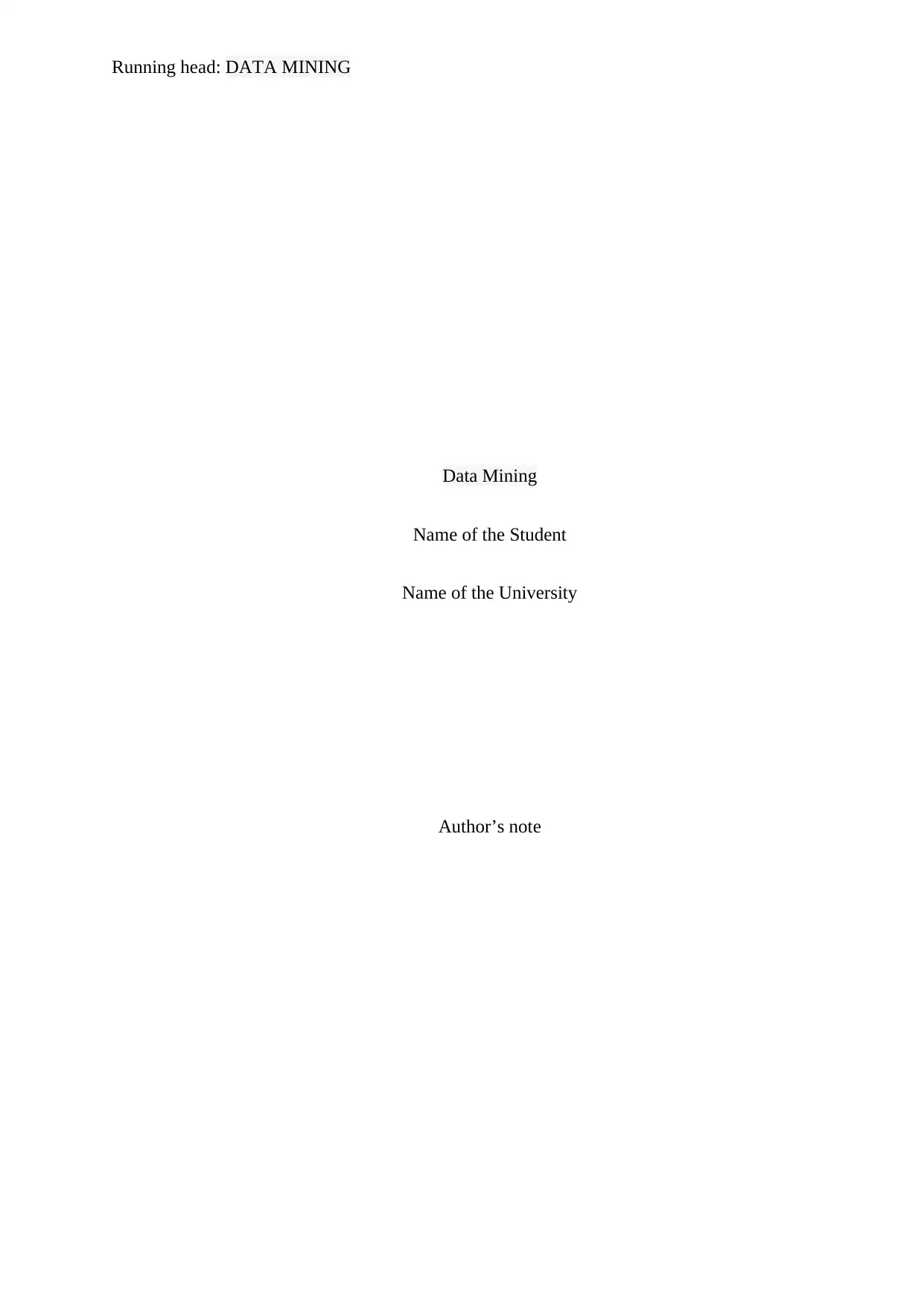
Running head: DATA MINING
Data Mining
Name of the Student
Name of the University
Author’s note
Data Mining
Name of the Student
Name of the University
Author’s note
Paraphrase This Document
Need a fresh take? Get an instant paraphrase of this document with our AI Paraphraser
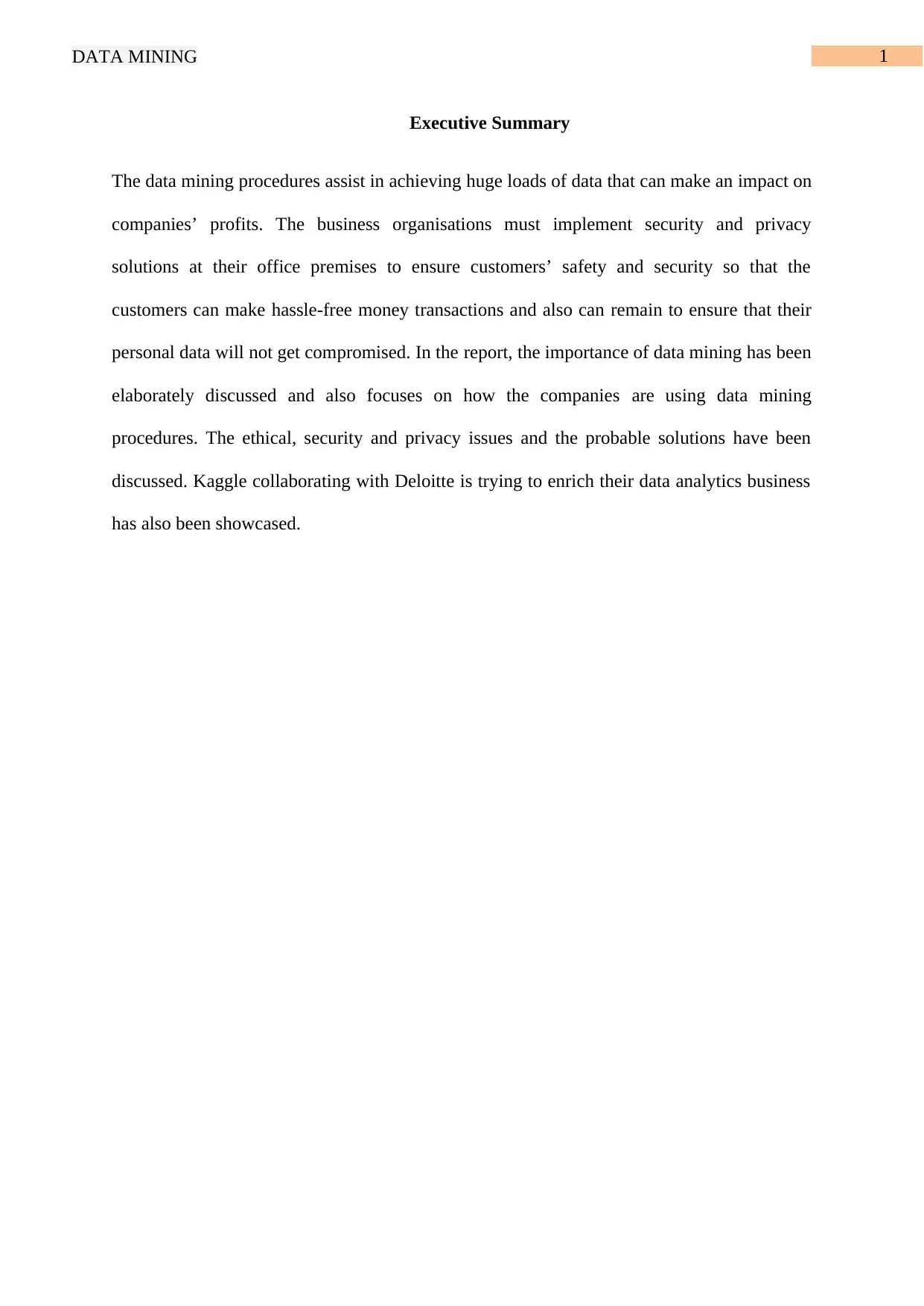
1DATA MINING
Executive Summary
The data mining procedures assist in achieving huge loads of data that can make an impact on
companies’ profits. The business organisations must implement security and privacy
solutions at their office premises to ensure customers’ safety and security so that the
customers can make hassle-free money transactions and also can remain to ensure that their
personal data will not get compromised. In the report, the importance of data mining has been
elaborately discussed and also focuses on how the companies are using data mining
procedures. The ethical, security and privacy issues and the probable solutions have been
discussed. Kaggle collaborating with Deloitte is trying to enrich their data analytics business
has also been showcased.
Executive Summary
The data mining procedures assist in achieving huge loads of data that can make an impact on
companies’ profits. The business organisations must implement security and privacy
solutions at their office premises to ensure customers’ safety and security so that the
customers can make hassle-free money transactions and also can remain to ensure that their
personal data will not get compromised. In the report, the importance of data mining has been
elaborately discussed and also focuses on how the companies are using data mining
procedures. The ethical, security and privacy issues and the probable solutions have been
discussed. Kaggle collaborating with Deloitte is trying to enrich their data analytics business
has also been showcased.
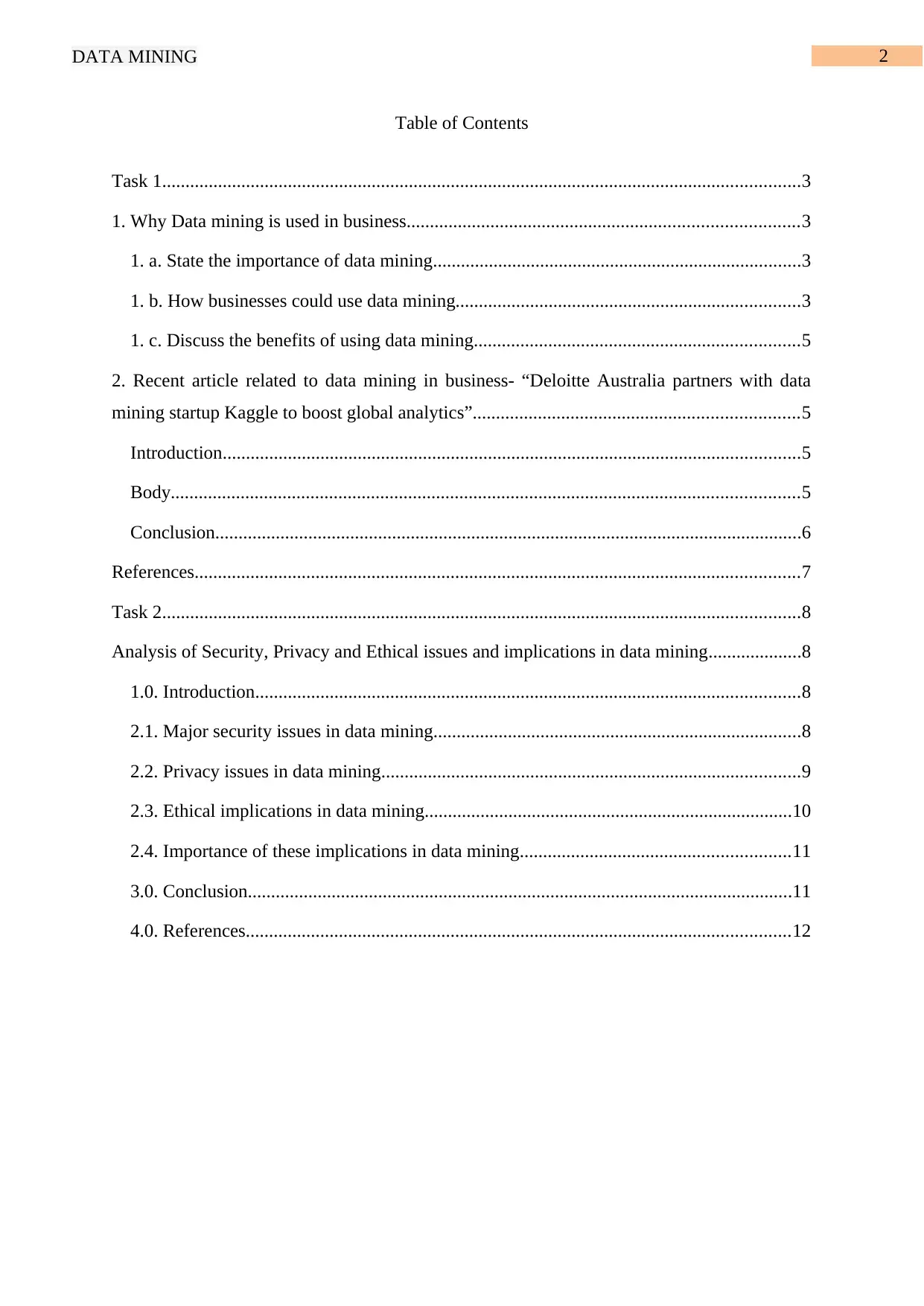
2DATA MINING
Table of Contents
Task 1.........................................................................................................................................3
1. Why Data mining is used in business....................................................................................3
1. a. State the importance of data mining...............................................................................3
1. b. How businesses could use data mining..........................................................................3
1. c. Discuss the benefits of using data mining......................................................................5
2. Recent article related to data mining in business- “Deloitte Australia partners with data
mining startup Kaggle to boost global analytics”......................................................................5
Introduction............................................................................................................................5
Body.......................................................................................................................................5
Conclusion..............................................................................................................................6
References..................................................................................................................................7
Task 2.........................................................................................................................................8
Analysis of Security, Privacy and Ethical issues and implications in data mining....................8
1.0. Introduction.....................................................................................................................8
2.1. Major security issues in data mining...............................................................................8
2.2. Privacy issues in data mining..........................................................................................9
2.3. Ethical implications in data mining...............................................................................10
2.4. Importance of these implications in data mining..........................................................11
3.0. Conclusion.....................................................................................................................11
4.0. References.....................................................................................................................12
Table of Contents
Task 1.........................................................................................................................................3
1. Why Data mining is used in business....................................................................................3
1. a. State the importance of data mining...............................................................................3
1. b. How businesses could use data mining..........................................................................3
1. c. Discuss the benefits of using data mining......................................................................5
2. Recent article related to data mining in business- “Deloitte Australia partners with data
mining startup Kaggle to boost global analytics”......................................................................5
Introduction............................................................................................................................5
Body.......................................................................................................................................5
Conclusion..............................................................................................................................6
References..................................................................................................................................7
Task 2.........................................................................................................................................8
Analysis of Security, Privacy and Ethical issues and implications in data mining....................8
1.0. Introduction.....................................................................................................................8
2.1. Major security issues in data mining...............................................................................8
2.2. Privacy issues in data mining..........................................................................................9
2.3. Ethical implications in data mining...............................................................................10
2.4. Importance of these implications in data mining..........................................................11
3.0. Conclusion.....................................................................................................................11
4.0. References.....................................................................................................................12
⊘ This is a preview!⊘
Do you want full access?
Subscribe today to unlock all pages.

Trusted by 1+ million students worldwide
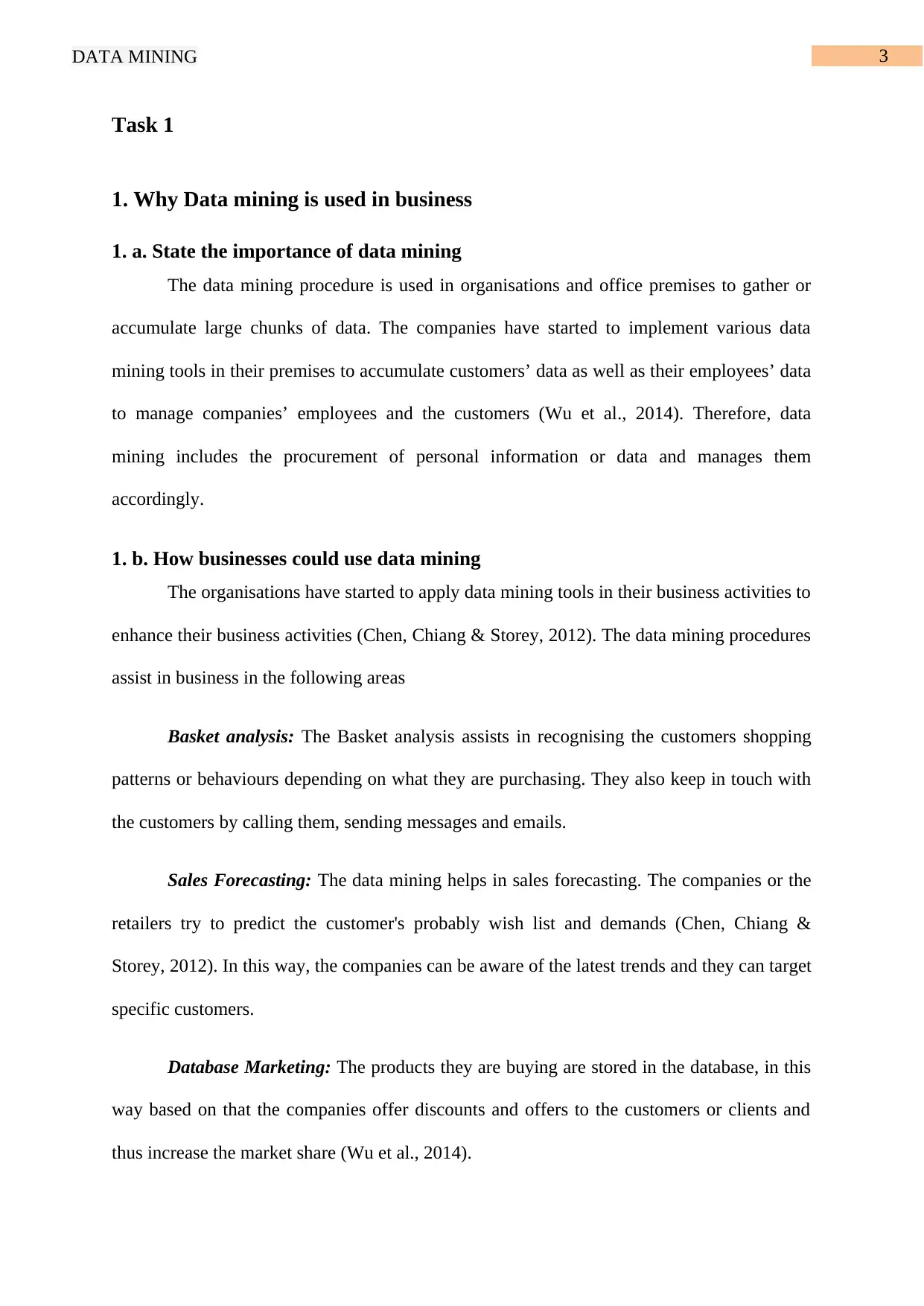
3DATA MINING
Task 1
1. Why Data mining is used in business
1. a. State the importance of data mining
The data mining procedure is used in organisations and office premises to gather or
accumulate large chunks of data. The companies have started to implement various data
mining tools in their premises to accumulate customers’ data as well as their employees’ data
to manage companies’ employees and the customers (Wu et al., 2014). Therefore, data
mining includes the procurement of personal information or data and manages them
accordingly.
1. b. How businesses could use data mining
The organisations have started to apply data mining tools in their business activities to
enhance their business activities (Chen, Chiang & Storey, 2012). The data mining procedures
assist in business in the following areas
Basket analysis: The Basket analysis assists in recognising the customers shopping
patterns or behaviours depending on what they are purchasing. They also keep in touch with
the customers by calling them, sending messages and emails.
Sales Forecasting: The data mining helps in sales forecasting. The companies or the
retailers try to predict the customer's probably wish list and demands (Chen, Chiang &
Storey, 2012). In this way, the companies can be aware of the latest trends and they can target
specific customers.
Database Marketing: The products they are buying are stored in the database, in this
way based on that the companies offer discounts and offers to the customers or clients and
thus increase the market share (Wu et al., 2014).
Task 1
1. Why Data mining is used in business
1. a. State the importance of data mining
The data mining procedure is used in organisations and office premises to gather or
accumulate large chunks of data. The companies have started to implement various data
mining tools in their premises to accumulate customers’ data as well as their employees’ data
to manage companies’ employees and the customers (Wu et al., 2014). Therefore, data
mining includes the procurement of personal information or data and manages them
accordingly.
1. b. How businesses could use data mining
The organisations have started to apply data mining tools in their business activities to
enhance their business activities (Chen, Chiang & Storey, 2012). The data mining procedures
assist in business in the following areas
Basket analysis: The Basket analysis assists in recognising the customers shopping
patterns or behaviours depending on what they are purchasing. They also keep in touch with
the customers by calling them, sending messages and emails.
Sales Forecasting: The data mining helps in sales forecasting. The companies or the
retailers try to predict the customer's probably wish list and demands (Chen, Chiang &
Storey, 2012). In this way, the companies can be aware of the latest trends and they can target
specific customers.
Database Marketing: The products they are buying are stored in the database, in this
way based on that the companies offer discounts and offers to the customers or clients and
thus increase the market share (Wu et al., 2014).
Paraphrase This Document
Need a fresh take? Get an instant paraphrase of this document with our AI Paraphraser
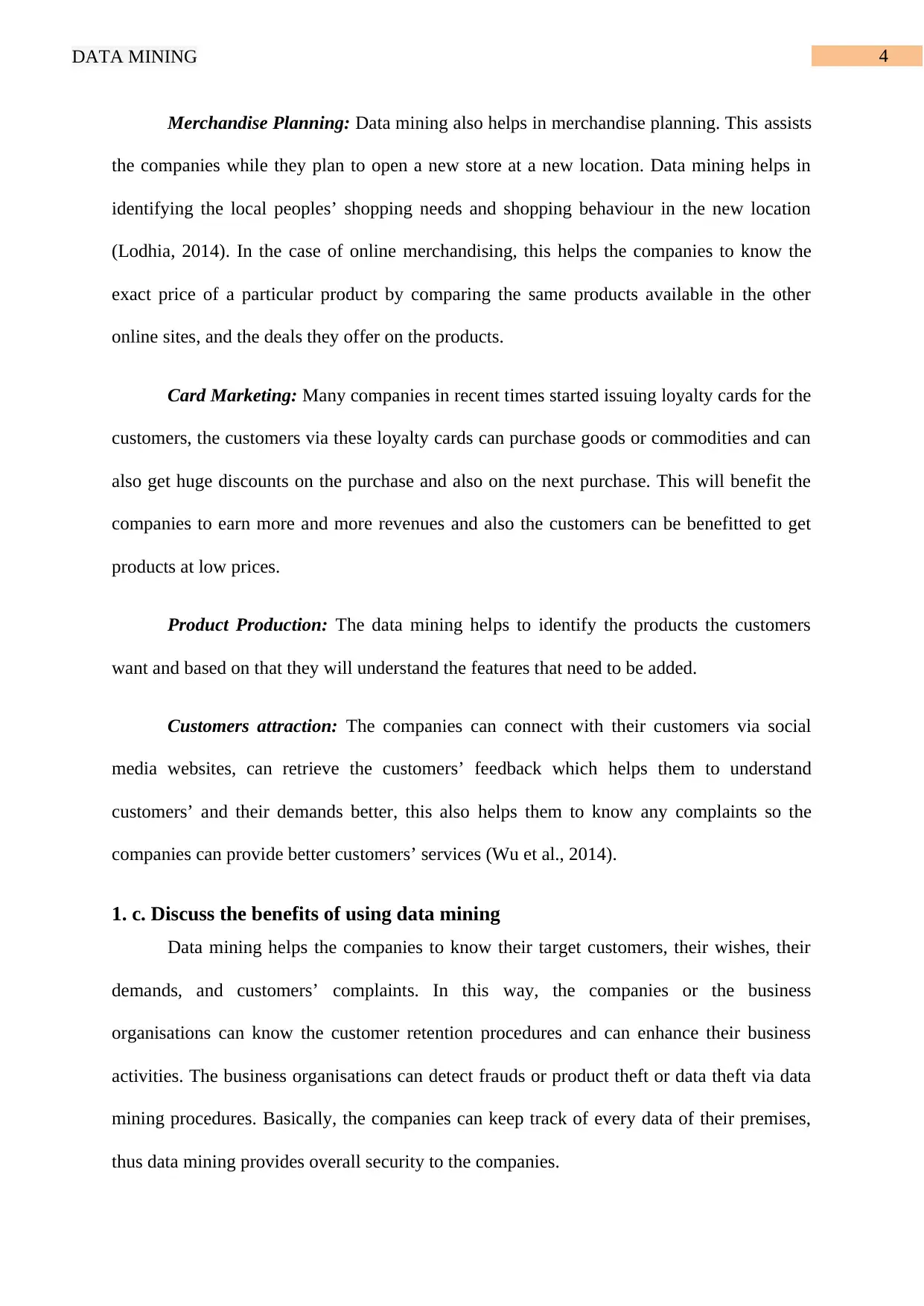
4DATA MINING
Merchandise Planning: Data mining also helps in merchandise planning. This assists
the companies while they plan to open a new store at a new location. Data mining helps in
identifying the local peoples’ shopping needs and shopping behaviour in the new location
(Lodhia, 2014). In the case of online merchandising, this helps the companies to know the
exact price of a particular product by comparing the same products available in the other
online sites, and the deals they offer on the products.
Card Marketing: Many companies in recent times started issuing loyalty cards for the
customers, the customers via these loyalty cards can purchase goods or commodities and can
also get huge discounts on the purchase and also on the next purchase. This will benefit the
companies to earn more and more revenues and also the customers can be benefitted to get
products at low prices.
Product Production: The data mining helps to identify the products the customers
want and based on that they will understand the features that need to be added.
Customers attraction: The companies can connect with their customers via social
media websites, can retrieve the customers’ feedback which helps them to understand
customers’ and their demands better, this also helps them to know any complaints so the
companies can provide better customers’ services (Wu et al., 2014).
1. c. Discuss the benefits of using data mining
Data mining helps the companies to know their target customers, their wishes, their
demands, and customers’ complaints. In this way, the companies or the business
organisations can know the customer retention procedures and can enhance their business
activities. The business organisations can detect frauds or product theft or data theft via data
mining procedures. Basically, the companies can keep track of every data of their premises,
thus data mining provides overall security to the companies.
Merchandise Planning: Data mining also helps in merchandise planning. This assists
the companies while they plan to open a new store at a new location. Data mining helps in
identifying the local peoples’ shopping needs and shopping behaviour in the new location
(Lodhia, 2014). In the case of online merchandising, this helps the companies to know the
exact price of a particular product by comparing the same products available in the other
online sites, and the deals they offer on the products.
Card Marketing: Many companies in recent times started issuing loyalty cards for the
customers, the customers via these loyalty cards can purchase goods or commodities and can
also get huge discounts on the purchase and also on the next purchase. This will benefit the
companies to earn more and more revenues and also the customers can be benefitted to get
products at low prices.
Product Production: The data mining helps to identify the products the customers
want and based on that they will understand the features that need to be added.
Customers attraction: The companies can connect with their customers via social
media websites, can retrieve the customers’ feedback which helps them to understand
customers’ and their demands better, this also helps them to know any complaints so the
companies can provide better customers’ services (Wu et al., 2014).
1. c. Discuss the benefits of using data mining
Data mining helps the companies to know their target customers, their wishes, their
demands, and customers’ complaints. In this way, the companies or the business
organisations can know the customer retention procedures and can enhance their business
activities. The business organisations can detect frauds or product theft or data theft via data
mining procedures. Basically, the companies can keep track of every data of their premises,
thus data mining provides overall security to the companies.
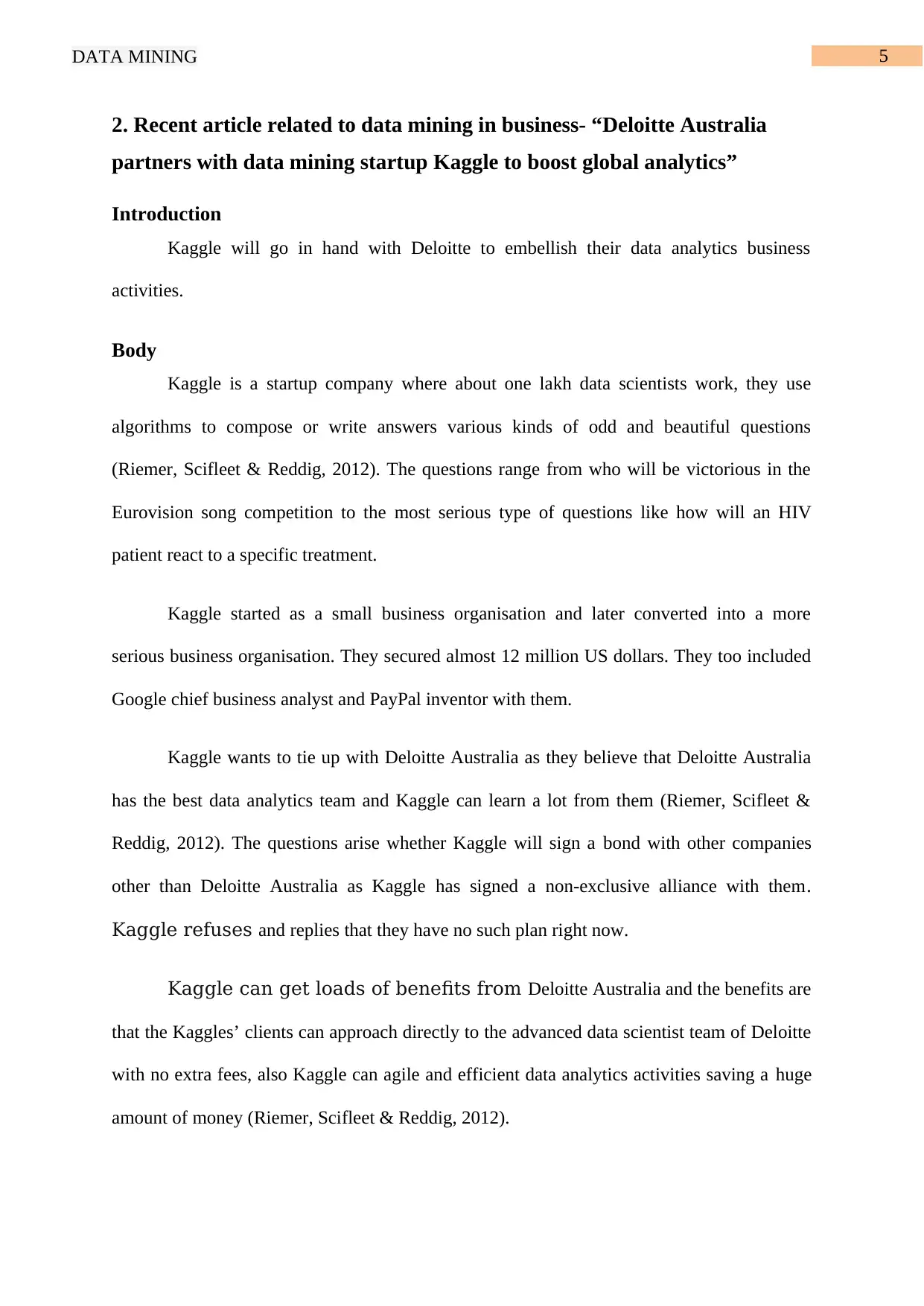
5DATA MINING
2. Recent article related to data mining in business- “Deloitte Australia
partners with data mining startup Kaggle to boost global analytics”
Introduction
Kaggle will go in hand with Deloitte to embellish their data analytics business
activities.
Body
Kaggle is a startup company where about one lakh data scientists work, they use
algorithms to compose or write answers various kinds of odd and beautiful questions
(Riemer, Scifleet & Reddig, 2012). The questions range from who will be victorious in the
Eurovision song competition to the most serious type of questions like how will an HIV
patient react to a specific treatment.
Kaggle started as a small business organisation and later converted into a more
serious business organisation. They secured almost 12 million US dollars. They too included
Google chief business analyst and PayPal inventor with them.
Kaggle wants to tie up with Deloitte Australia as they believe that Deloitte Australia
has the best data analytics team and Kaggle can learn a lot from them (Riemer, Scifleet &
Reddig, 2012). The questions arise whether Kaggle will sign a bond with other companies
other than Deloitte Australia as Kaggle has signed a non-exclusive alliance with them.
Kaggle refuses and replies that they have no such plan right now.
Kaggle can get loads of benefits from Deloitte Australia and the benefits are
that the Kaggles’ clients can approach directly to the advanced data scientist team of Deloitte
with no extra fees, also Kaggle can agile and efficient data analytics activities saving a huge
amount of money (Riemer, Scifleet & Reddig, 2012).
2. Recent article related to data mining in business- “Deloitte Australia
partners with data mining startup Kaggle to boost global analytics”
Introduction
Kaggle will go in hand with Deloitte to embellish their data analytics business
activities.
Body
Kaggle is a startup company where about one lakh data scientists work, they use
algorithms to compose or write answers various kinds of odd and beautiful questions
(Riemer, Scifleet & Reddig, 2012). The questions range from who will be victorious in the
Eurovision song competition to the most serious type of questions like how will an HIV
patient react to a specific treatment.
Kaggle started as a small business organisation and later converted into a more
serious business organisation. They secured almost 12 million US dollars. They too included
Google chief business analyst and PayPal inventor with them.
Kaggle wants to tie up with Deloitte Australia as they believe that Deloitte Australia
has the best data analytics team and Kaggle can learn a lot from them (Riemer, Scifleet &
Reddig, 2012). The questions arise whether Kaggle will sign a bond with other companies
other than Deloitte Australia as Kaggle has signed a non-exclusive alliance with them.
Kaggle refuses and replies that they have no such plan right now.
Kaggle can get loads of benefits from Deloitte Australia and the benefits are
that the Kaggles’ clients can approach directly to the advanced data scientist team of Deloitte
with no extra fees, also Kaggle can agile and efficient data analytics activities saving a huge
amount of money (Riemer, Scifleet & Reddig, 2012).
⊘ This is a preview!⊘
Do you want full access?
Subscribe today to unlock all pages.

Trusted by 1+ million students worldwide

6DATA MINING
Conclusion
It can be concluded that Kaggle working with the Deloitte can enhance their data
analytics business at a minimal charge, can work with one of the best data analytics team of
the world.
Conclusion
It can be concluded that Kaggle working with the Deloitte can enhance their data
analytics business at a minimal charge, can work with one of the best data analytics team of
the world.
Paraphrase This Document
Need a fresh take? Get an instant paraphrase of this document with our AI Paraphraser
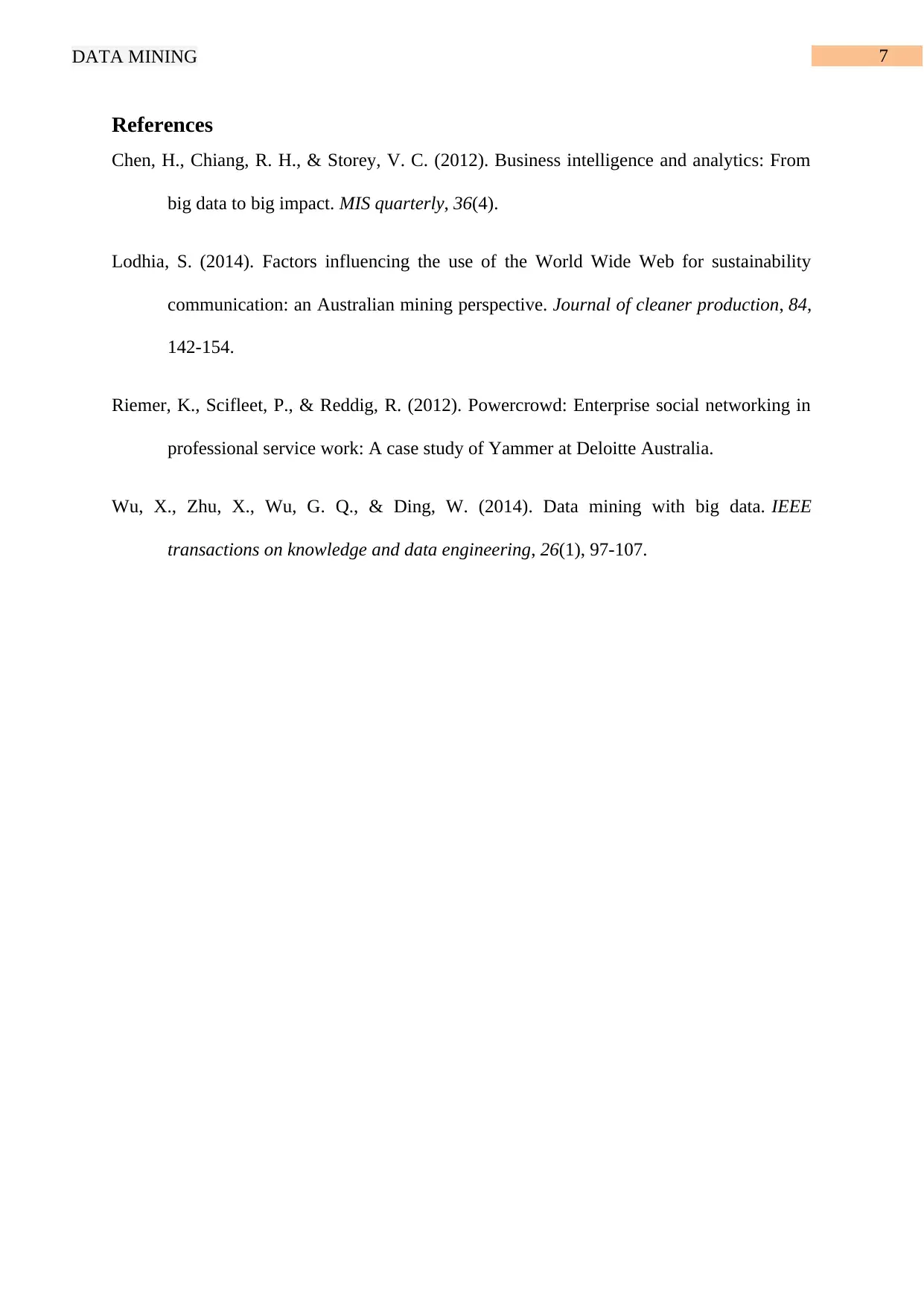
7DATA MINING
References
Chen, H., Chiang, R. H., & Storey, V. C. (2012). Business intelligence and analytics: From
big data to big impact. MIS quarterly, 36(4).
Lodhia, S. (2014). Factors influencing the use of the World Wide Web for sustainability
communication: an Australian mining perspective. Journal of cleaner production, 84,
142-154.
Riemer, K., Scifleet, P., & Reddig, R. (2012). Powercrowd: Enterprise social networking in
professional service work: A case study of Yammer at Deloitte Australia.
Wu, X., Zhu, X., Wu, G. Q., & Ding, W. (2014). Data mining with big data. IEEE
transactions on knowledge and data engineering, 26(1), 97-107.
References
Chen, H., Chiang, R. H., & Storey, V. C. (2012). Business intelligence and analytics: From
big data to big impact. MIS quarterly, 36(4).
Lodhia, S. (2014). Factors influencing the use of the World Wide Web for sustainability
communication: an Australian mining perspective. Journal of cleaner production, 84,
142-154.
Riemer, K., Scifleet, P., & Reddig, R. (2012). Powercrowd: Enterprise social networking in
professional service work: A case study of Yammer at Deloitte Australia.
Wu, X., Zhu, X., Wu, G. Q., & Ding, W. (2014). Data mining with big data. IEEE
transactions on knowledge and data engineering, 26(1), 97-107.
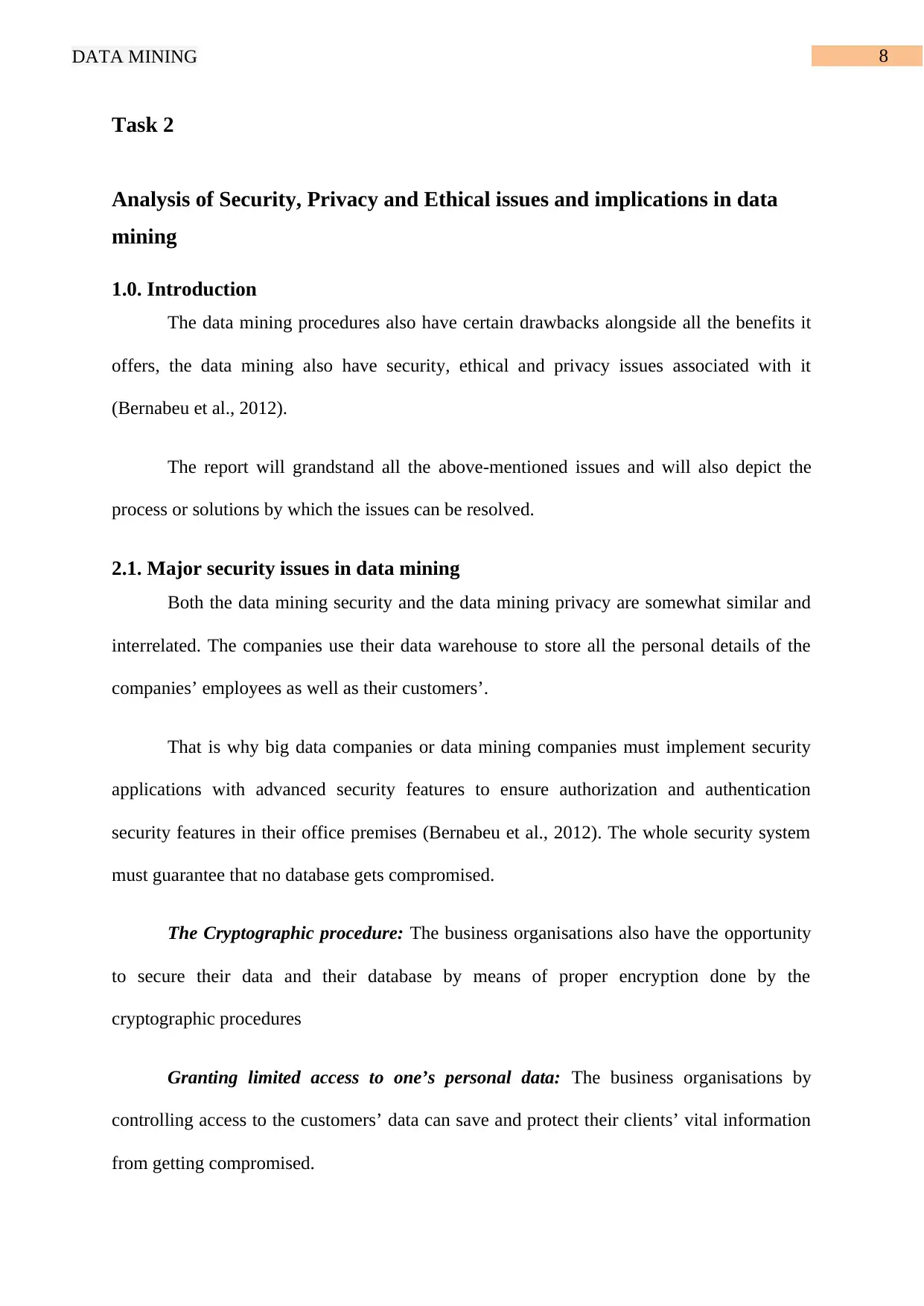
8DATA MINING
Task 2
Analysis of Security, Privacy and Ethical issues and implications in data
mining
1.0. Introduction
The data mining procedures also have certain drawbacks alongside all the benefits it
offers, the data mining also have security, ethical and privacy issues associated with it
(Bernabeu et al., 2012).
The report will grandstand all the above-mentioned issues and will also depict the
process or solutions by which the issues can be resolved.
2.1. Major security issues in data mining
Both the data mining security and the data mining privacy are somewhat similar and
interrelated. The companies use their data warehouse to store all the personal details of the
companies’ employees as well as their customers’.
That is why big data companies or data mining companies must implement security
applications with advanced security features to ensure authorization and authentication
security features in their office premises (Bernabeu et al., 2012). The whole security system
must guarantee that no database gets compromised.
The Cryptographic procedure: The business organisations also have the opportunity
to secure their data and their database by means of proper encryption done by the
cryptographic procedures
Granting limited access to one’s personal data: The business organisations by
controlling access to the customers’ data can save and protect their clients’ vital information
from getting compromised.
Task 2
Analysis of Security, Privacy and Ethical issues and implications in data
mining
1.0. Introduction
The data mining procedures also have certain drawbacks alongside all the benefits it
offers, the data mining also have security, ethical and privacy issues associated with it
(Bernabeu et al., 2012).
The report will grandstand all the above-mentioned issues and will also depict the
process or solutions by which the issues can be resolved.
2.1. Major security issues in data mining
Both the data mining security and the data mining privacy are somewhat similar and
interrelated. The companies use their data warehouse to store all the personal details of the
companies’ employees as well as their customers’.
That is why big data companies or data mining companies must implement security
applications with advanced security features to ensure authorization and authentication
security features in their office premises (Bernabeu et al., 2012). The whole security system
must guarantee that no database gets compromised.
The Cryptographic procedure: The business organisations also have the opportunity
to secure their data and their database by means of proper encryption done by the
cryptographic procedures
Granting limited access to one’s personal data: The business organisations by
controlling access to the customers’ data can save and protect their clients’ vital information
from getting compromised.
⊘ This is a preview!⊘
Do you want full access?
Subscribe today to unlock all pages.

Trusted by 1+ million students worldwide
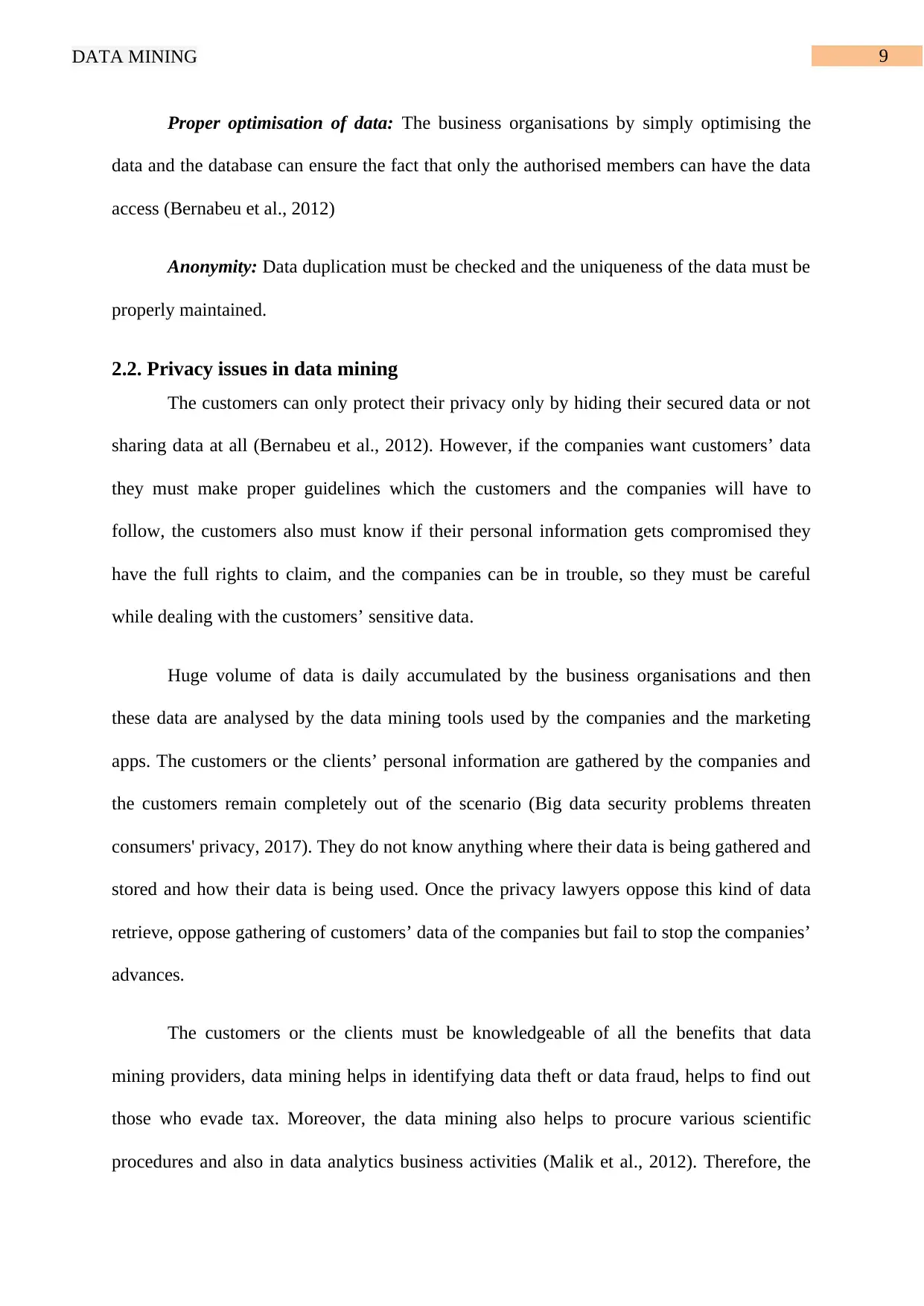
9DATA MINING
Proper optimisation of data: The business organisations by simply optimising the
data and the database can ensure the fact that only the authorised members can have the data
access (Bernabeu et al., 2012)
Anonymity: Data duplication must be checked and the uniqueness of the data must be
properly maintained.
2.2. Privacy issues in data mining
The customers can only protect their privacy only by hiding their secured data or not
sharing data at all (Bernabeu et al., 2012). However, if the companies want customers’ data
they must make proper guidelines which the customers and the companies will have to
follow, the customers also must know if their personal information gets compromised they
have the full rights to claim, and the companies can be in trouble, so they must be careful
while dealing with the customers’ sensitive data.
Huge volume of data is daily accumulated by the business organisations and then
these data are analysed by the data mining tools used by the companies and the marketing
apps. The customers or the clients’ personal information are gathered by the companies and
the customers remain completely out of the scenario (Big data security problems threaten
consumers' privacy, 2017). They do not know anything where their data is being gathered and
stored and how their data is being used. Once the privacy lawyers oppose this kind of data
retrieve, oppose gathering of customers’ data of the companies but fail to stop the companies’
advances.
The customers or the clients must be knowledgeable of all the benefits that data
mining providers, data mining helps in identifying data theft or data fraud, helps to find out
those who evade tax. Moreover, the data mining also helps to procure various scientific
procedures and also in data analytics business activities (Malik et al., 2012). Therefore, the
Proper optimisation of data: The business organisations by simply optimising the
data and the database can ensure the fact that only the authorised members can have the data
access (Bernabeu et al., 2012)
Anonymity: Data duplication must be checked and the uniqueness of the data must be
properly maintained.
2.2. Privacy issues in data mining
The customers can only protect their privacy only by hiding their secured data or not
sharing data at all (Bernabeu et al., 2012). However, if the companies want customers’ data
they must make proper guidelines which the customers and the companies will have to
follow, the customers also must know if their personal information gets compromised they
have the full rights to claim, and the companies can be in trouble, so they must be careful
while dealing with the customers’ sensitive data.
Huge volume of data is daily accumulated by the business organisations and then
these data are analysed by the data mining tools used by the companies and the marketing
apps. The customers or the clients’ personal information are gathered by the companies and
the customers remain completely out of the scenario (Big data security problems threaten
consumers' privacy, 2017). They do not know anything where their data is being gathered and
stored and how their data is being used. Once the privacy lawyers oppose this kind of data
retrieve, oppose gathering of customers’ data of the companies but fail to stop the companies’
advances.
The customers or the clients must be knowledgeable of all the benefits that data
mining providers, data mining helps in identifying data theft or data fraud, helps to find out
those who evade tax. Moreover, the data mining also helps to procure various scientific
procedures and also in data analytics business activities (Malik et al., 2012). Therefore, the
Paraphrase This Document
Need a fresh take? Get an instant paraphrase of this document with our AI Paraphraser
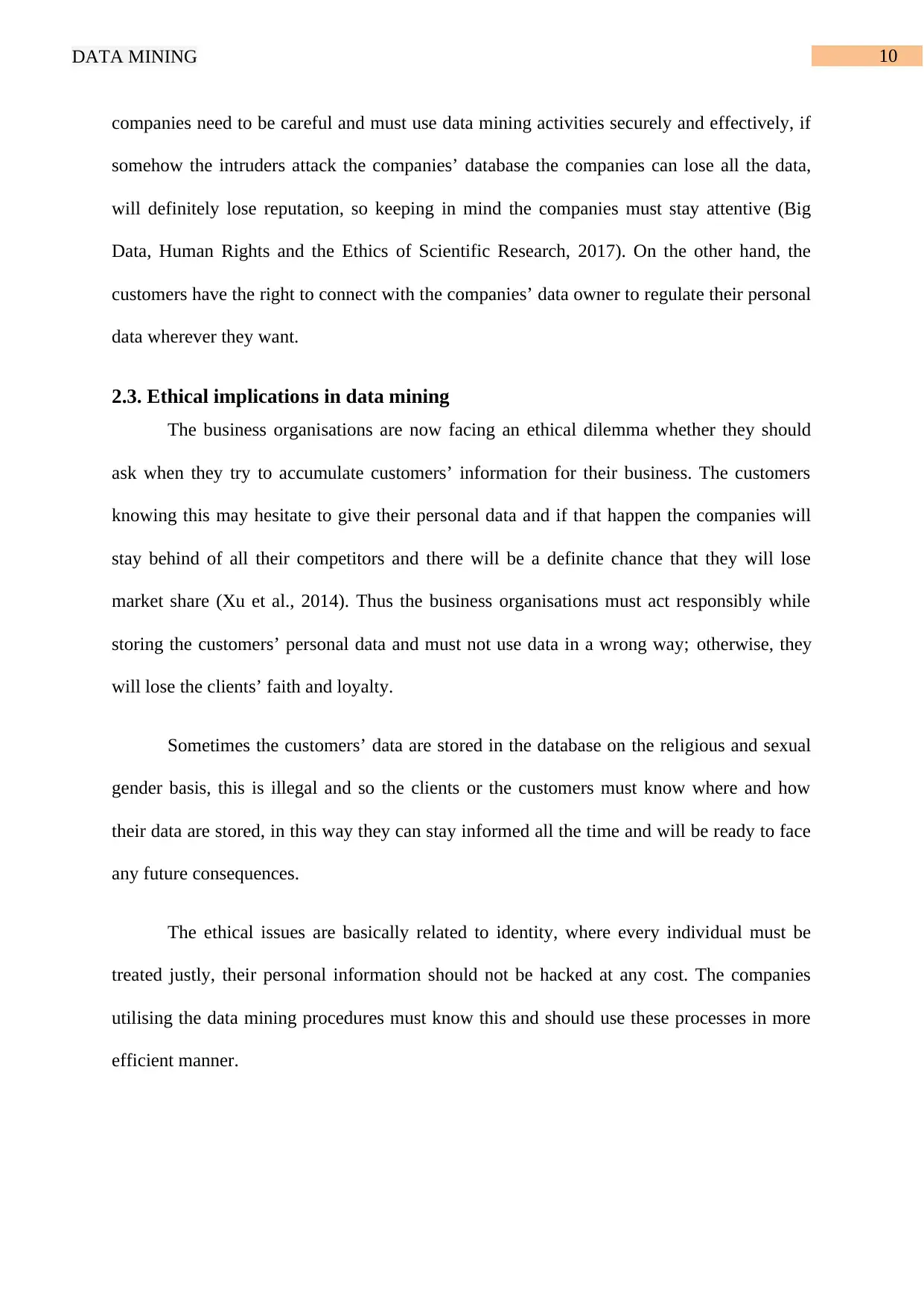
10DATA MINING
companies need to be careful and must use data mining activities securely and effectively, if
somehow the intruders attack the companies’ database the companies can lose all the data,
will definitely lose reputation, so keeping in mind the companies must stay attentive (Big
Data, Human Rights and the Ethics of Scientific Research, 2017). On the other hand, the
customers have the right to connect with the companies’ data owner to regulate their personal
data wherever they want.
2.3. Ethical implications in data mining
The business organisations are now facing an ethical dilemma whether they should
ask when they try to accumulate customers’ information for their business. The customers
knowing this may hesitate to give their personal data and if that happen the companies will
stay behind of all their competitors and there will be a definite chance that they will lose
market share (Xu et al., 2014). Thus the business organisations must act responsibly while
storing the customers’ personal data and must not use data in a wrong way; otherwise, they
will lose the clients’ faith and loyalty.
Sometimes the customers’ data are stored in the database on the religious and sexual
gender basis, this is illegal and so the clients or the customers must know where and how
their data are stored, in this way they can stay informed all the time and will be ready to face
any future consequences.
The ethical issues are basically related to identity, where every individual must be
treated justly, their personal information should not be hacked at any cost. The companies
utilising the data mining procedures must know this and should use these processes in more
efficient manner.
companies need to be careful and must use data mining activities securely and effectively, if
somehow the intruders attack the companies’ database the companies can lose all the data,
will definitely lose reputation, so keeping in mind the companies must stay attentive (Big
Data, Human Rights and the Ethics of Scientific Research, 2017). On the other hand, the
customers have the right to connect with the companies’ data owner to regulate their personal
data wherever they want.
2.3. Ethical implications in data mining
The business organisations are now facing an ethical dilemma whether they should
ask when they try to accumulate customers’ information for their business. The customers
knowing this may hesitate to give their personal data and if that happen the companies will
stay behind of all their competitors and there will be a definite chance that they will lose
market share (Xu et al., 2014). Thus the business organisations must act responsibly while
storing the customers’ personal data and must not use data in a wrong way; otherwise, they
will lose the clients’ faith and loyalty.
Sometimes the customers’ data are stored in the database on the religious and sexual
gender basis, this is illegal and so the clients or the customers must know where and how
their data are stored, in this way they can stay informed all the time and will be ready to face
any future consequences.
The ethical issues are basically related to identity, where every individual must be
treated justly, their personal information should not be hacked at any cost. The companies
utilising the data mining procedures must know this and should use these processes in more
efficient manner.
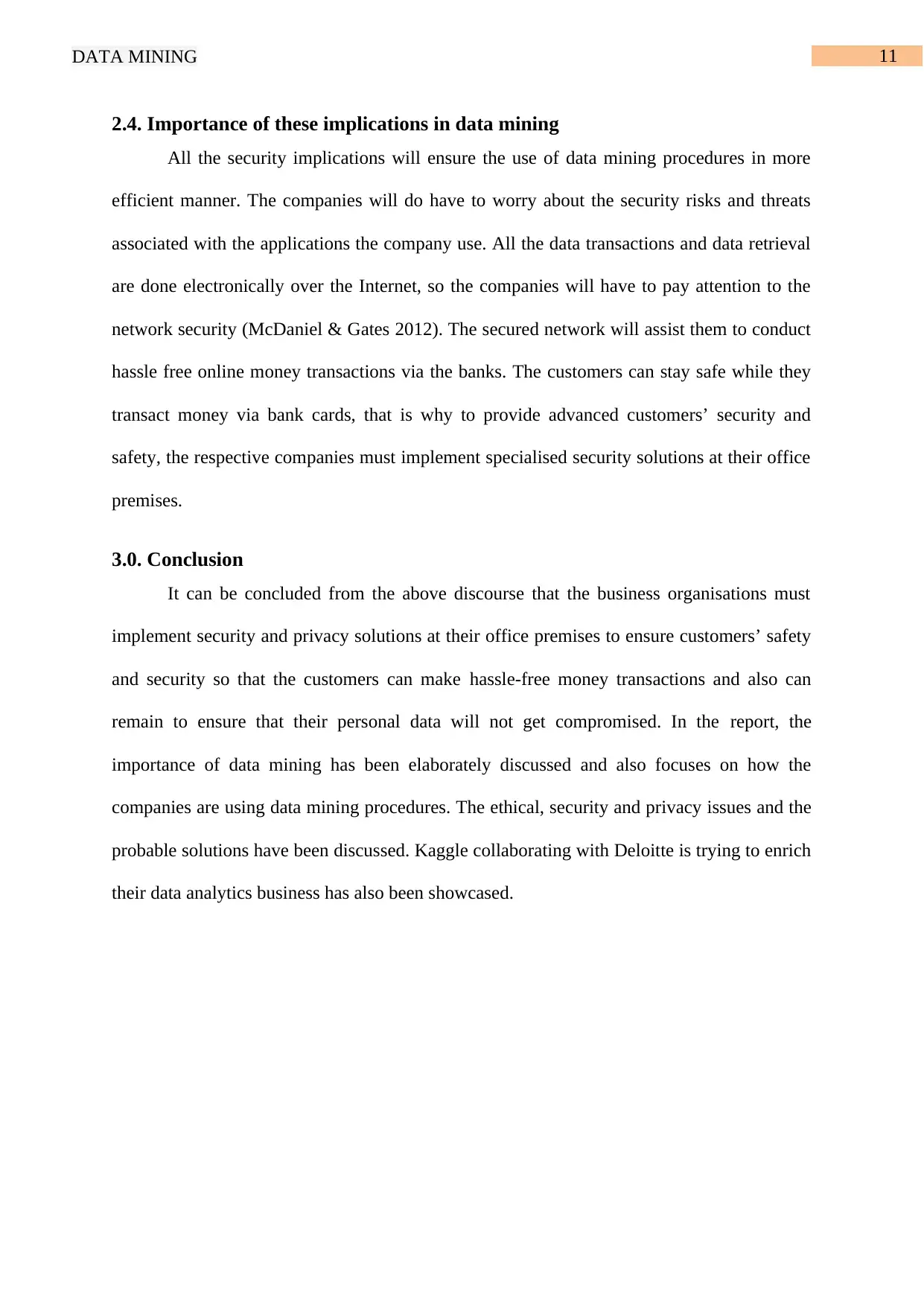
11DATA MINING
2.4. Importance of these implications in data mining
All the security implications will ensure the use of data mining procedures in more
efficient manner. The companies will do have to worry about the security risks and threats
associated with the applications the company use. All the data transactions and data retrieval
are done electronically over the Internet, so the companies will have to pay attention to the
network security (McDaniel & Gates 2012). The secured network will assist them to conduct
hassle free online money transactions via the banks. The customers can stay safe while they
transact money via bank cards, that is why to provide advanced customers’ security and
safety, the respective companies must implement specialised security solutions at their office
premises.
3.0. Conclusion
It can be concluded from the above discourse that the business organisations must
implement security and privacy solutions at their office premises to ensure customers’ safety
and security so that the customers can make hassle-free money transactions and also can
remain to ensure that their personal data will not get compromised. In the report, the
importance of data mining has been elaborately discussed and also focuses on how the
companies are using data mining procedures. The ethical, security and privacy issues and the
probable solutions have been discussed. Kaggle collaborating with Deloitte is trying to enrich
their data analytics business has also been showcased.
2.4. Importance of these implications in data mining
All the security implications will ensure the use of data mining procedures in more
efficient manner. The companies will do have to worry about the security risks and threats
associated with the applications the company use. All the data transactions and data retrieval
are done electronically over the Internet, so the companies will have to pay attention to the
network security (McDaniel & Gates 2012). The secured network will assist them to conduct
hassle free online money transactions via the banks. The customers can stay safe while they
transact money via bank cards, that is why to provide advanced customers’ security and
safety, the respective companies must implement specialised security solutions at their office
premises.
3.0. Conclusion
It can be concluded from the above discourse that the business organisations must
implement security and privacy solutions at their office premises to ensure customers’ safety
and security so that the customers can make hassle-free money transactions and also can
remain to ensure that their personal data will not get compromised. In the report, the
importance of data mining has been elaborately discussed and also focuses on how the
companies are using data mining procedures. The ethical, security and privacy issues and the
probable solutions have been discussed. Kaggle collaborating with Deloitte is trying to enrich
their data analytics business has also been showcased.
⊘ This is a preview!⊘
Do you want full access?
Subscribe today to unlock all pages.

Trusted by 1+ million students worldwide
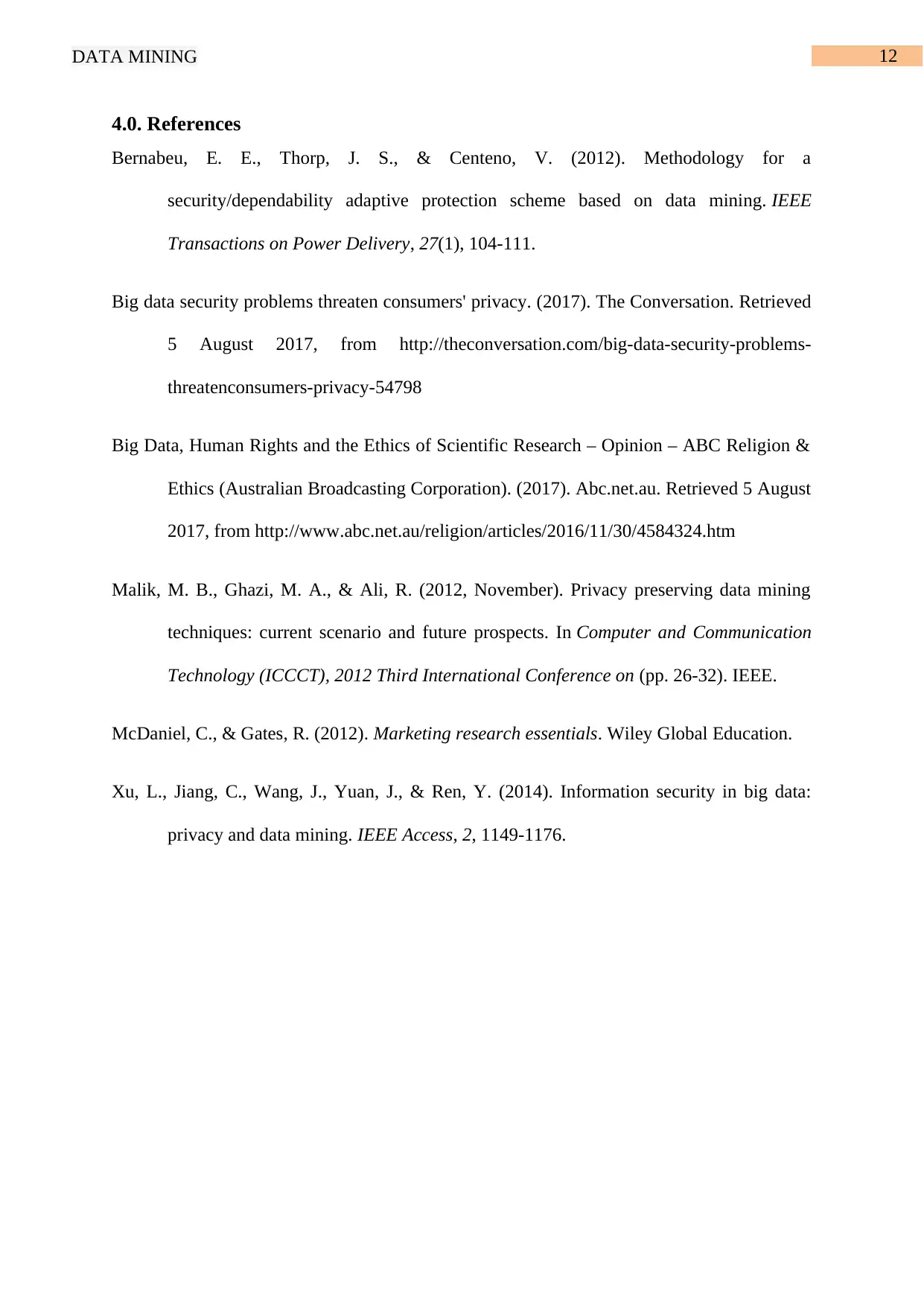
12DATA MINING
4.0. References
Bernabeu, E. E., Thorp, J. S., & Centeno, V. (2012). Methodology for a
security/dependability adaptive protection scheme based on data mining. IEEE
Transactions on Power Delivery, 27(1), 104-111.
Big data security problems threaten consumers' privacy. (2017). The Conversation. Retrieved
5 August 2017, from http://theconversation.com/big-data-security-problems-
threatenconsumers-privacy-54798
Big Data, Human Rights and the Ethics of Scientific Research – Opinion – ABC Religion &
Ethics (Australian Broadcasting Corporation). (2017). Abc.net.au. Retrieved 5 August
2017, from http://www.abc.net.au/religion/articles/2016/11/30/4584324.htm
Malik, M. B., Ghazi, M. A., & Ali, R. (2012, November). Privacy preserving data mining
techniques: current scenario and future prospects. In Computer and Communication
Technology (ICCCT), 2012 Third International Conference on (pp. 26-32). IEEE.
McDaniel, C., & Gates, R. (2012). Marketing research essentials. Wiley Global Education.
Xu, L., Jiang, C., Wang, J., Yuan, J., & Ren, Y. (2014). Information security in big data:
privacy and data mining. IEEE Access, 2, 1149-1176.
4.0. References
Bernabeu, E. E., Thorp, J. S., & Centeno, V. (2012). Methodology for a
security/dependability adaptive protection scheme based on data mining. IEEE
Transactions on Power Delivery, 27(1), 104-111.
Big data security problems threaten consumers' privacy. (2017). The Conversation. Retrieved
5 August 2017, from http://theconversation.com/big-data-security-problems-
threatenconsumers-privacy-54798
Big Data, Human Rights and the Ethics of Scientific Research – Opinion – ABC Religion &
Ethics (Australian Broadcasting Corporation). (2017). Abc.net.au. Retrieved 5 August
2017, from http://www.abc.net.au/religion/articles/2016/11/30/4584324.htm
Malik, M. B., Ghazi, M. A., & Ali, R. (2012, November). Privacy preserving data mining
techniques: current scenario and future prospects. In Computer and Communication
Technology (ICCCT), 2012 Third International Conference on (pp. 26-32). IEEE.
McDaniel, C., & Gates, R. (2012). Marketing research essentials. Wiley Global Education.
Xu, L., Jiang, C., Wang, J., Yuan, J., & Ren, Y. (2014). Information security in big data:
privacy and data mining. IEEE Access, 2, 1149-1176.
1 out of 13
Related Documents
Your All-in-One AI-Powered Toolkit for Academic Success.
+13062052269
info@desklib.com
Available 24*7 on WhatsApp / Email
![[object Object]](/_next/static/media/star-bottom.7253800d.svg)
Unlock your academic potential
© 2024 | Zucol Services PVT LTD | All rights reserved.




